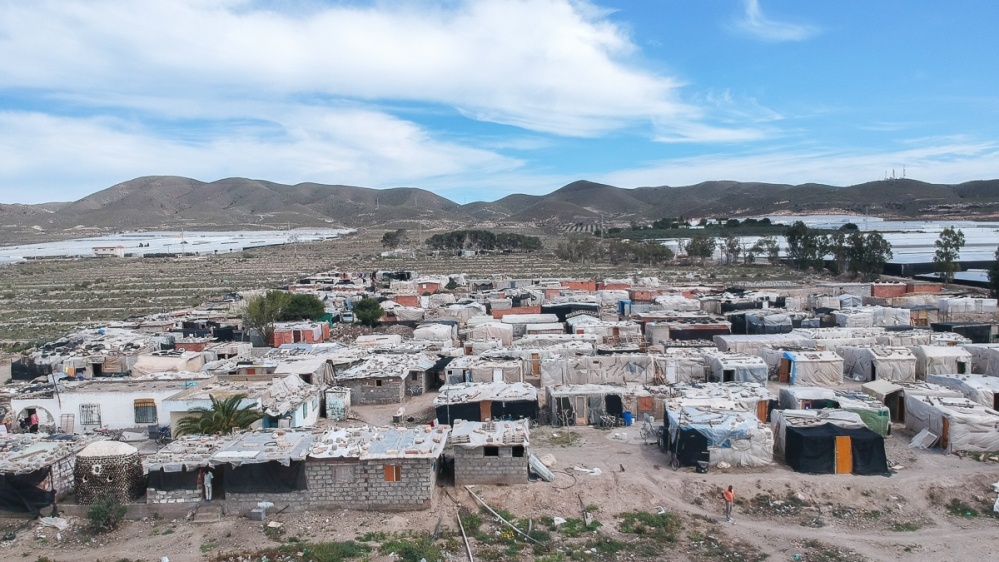Nearly 400 farmworkers rendered homeless after fire guts a settlement in Níjar (Almería)

NÍJAR – A new fire in another settlement occurred last Saturday, February 13, in the shanty town of workers from the Atochares field, near the district of Las Casillas de Atochares in the municipality of Níjar (Almería) has rendered several hundred farmworkers homeless.
The fire started around 9:30 p.m. and it spread throughout the town, built with pallets and bricks covered with plastic.
The fire lasted until 2:45 am, despite the fact that the firefighters had been in the place for several hours, as they explained to mebers of SOC-SAT, “because many of the residents were trying to rescue their belongings and made work tasks difficult.” Two people have been treated for burns. And it has affected more than half the town. Leaving homeless about 400 people who have lost everything. Some of which included documentation and the little money they had.
According to some of its inhabitants, the fire originated inside a shack along the starting line of the settlement. Its inhabitants were inside it and were surprised to see a fire in one of its walls. In addition, almost fifty vehicles have been burned. Some of its inhabitants, a half dozen, have settled in neighbouring tents. While others have started cleaning and removing debris: the vast majority intend to remain in place.
The town of Atochares, an extension of the one known by Don Domingo, has approximately 800 people. Mostly immigrants of sub-Saharan and Moroccan origin who work in the adjoining greenhouses. Some of them do not have a residence permit. Lack of electricity or drinking water or toilets add to their woes. SOC-SAT, a workers’ union had installed a facility last year with outside solidarity aid, but lack of clean drinking water is a big worry for the residents. Even the garbage collection service, which was installed by the Nijar City Council due to Covid-19, has now been withdrawn.
The day after the fire, as has become customary in similar cases, different NGOs, the Red Cross, CEPAIN, Almería Acoge, attended those affected by handing them clothing and food. But at no time has any representation of the City Council appeared, which has not offered any rehousing plan to its inhabitants. On the other hand, Voluntarios Gateras de Níjar, collected two kittens with severe burns that are being treated by a veterinarian in Níjar.
“This fire, whatever its causes will never be investigated, is not a fortuitous event. It is the consequence of a policy of labor and racial segregation, which is applied in all the fields of Almería.” an article on SOC-SAT website notes. “Many of these workers are not only paid below the legal wage, but are forced to work longer than the stipulated time. And even in many cases, they must pay their own legal contracts, without which they cannot obtain the Residence Permit.”, it further says.
Fires in the shanty towns are not uncommon. José Cuevas from the agricultural trade union SOC-SAT says that this fire is the fourth in Almeria within 18 months.
Residents live knowing they are at permanent risk of losing everything. “Many workers carry their papers everywhere they go, in case the shacks burn, not to lose their documentation,” José Antonio, who works for SAT Union in Huelva, told Ethical Consumers.
Last December, 200 people also lost their homes during a fire in Nijar. Thousands in Huelva, where fruit pickers live in similar conditions, have similarly lost their homes due to fires in recent years.
Covering over 31,000 hectares (76,600 acres) and visible from space, Almeria’s “sea of plastic” produces roughly 3.5 million tonnes of fruit and vegetables per year. According to regional distribution company Agrosol, 61 percent of Almeria’s produce is exported, with 99.8 percent bound for Europe – the Netherlands (13.55 percent), France (13.5 percent) and the UK (11.4 percent) are top markets.
“Viewed from above, the striking geometry of Almeria’s greenhouses resembles a work of science fiction: a sprawling, futuristic farming model of structural symmetry cultivating produce by the metric tonne in a land where water is scarce, the earth scorched and the sun blinding.” writes James Rippingale for Al-Jazeera.
In reality, what is referred to as Almeria’s “economic miracle” among Spanish economists is almost exclusively dependant on an invisible, expendable and often illegally employed migrant workers, toiling under 40-degree heat and extreme humidity.
